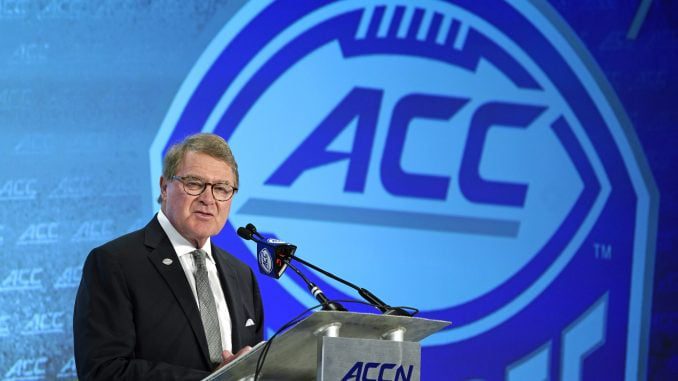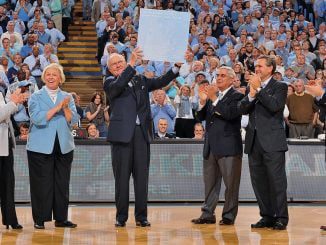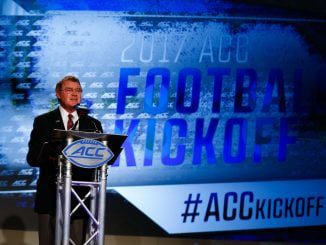
CHARLOTTE — ACC commissioner John Swofford isn’t a fan of gambling, especially on college events. But he’s also a realist, which is why despite his personal objections, he knows he might eventually have to bend on the subject now that single game wagering has become legal in several states.
“It’s obviously a changing world for us in regard to that,” Swofford said Wednesday at the ACC’s Football Kickoff event during his annual commissioner’s forum “Quite frankly, our presidents would like to see a carve-out for college athletics so that college athletics could not be gambled on, as well as high school athletics. We’ll see how that works out.’
Currently, there are seven states that allow sports gambling. That includes six — New Jersey, Pennsylvania, Mississippi, Delaware, West Virginia, New Mexico and West Virginia — that have passed laws legalizing it since the Supreme Court overturned a ban just over a year ago.
Another 28 and Washington D.C. have bills pending that could add them to the list. Because South Carolina, Virginia, Kentucky and Indiana in the ACC’s geographic footprint are among them, Swofford said that the conference will have to address the issue sooner rather than later.
“The laws are changing,” Swofford said. “I would hope that at some point, at the federal level, there’s some consistency brought to how this is done state to state, if it indeed is going to happen in a particular state.
“Obviously the states make that decision right now. It’s something we’re going to have to learn how to navigate.”
Gambling on sports, both legally in Nevada and illegally on the internet and on various other platforms, has been going on almost since there has been sports. Now that it’s becoming more mainstream, entities such as the ACC are scrambling to figure out how best to deal with it.
Swofford said that league representatives had a “pretty compelling conversation” on the subject at the ACC’s spring meetings in Florida. That includes discussions with television partner ESPN, which frequently airs shows and SportsCenter segments dealing with gambling.
The commissioner said the athletes that representing their schools at the meetings expressed specific concerns beyond the obvious effect college sports wagering could have on the integrity of the games.
“They’re very uncomfortable with the position it can put them in with their fellow students,’ Swofford said, “how they might be perceived walking into a classroom, and another student mad because they did something that cost them some money.”
Although it appears inevitable that gambling on sports will eventually become an accepted practice nationwide, Swofford is holding out hope that will steer clear of the college game.
“We haven’t given up on protecting the collegiate game,” he said. “I wouldn’t handicap that. I’ll use that term as to where that may end up. But we haven’t given up on that.”



